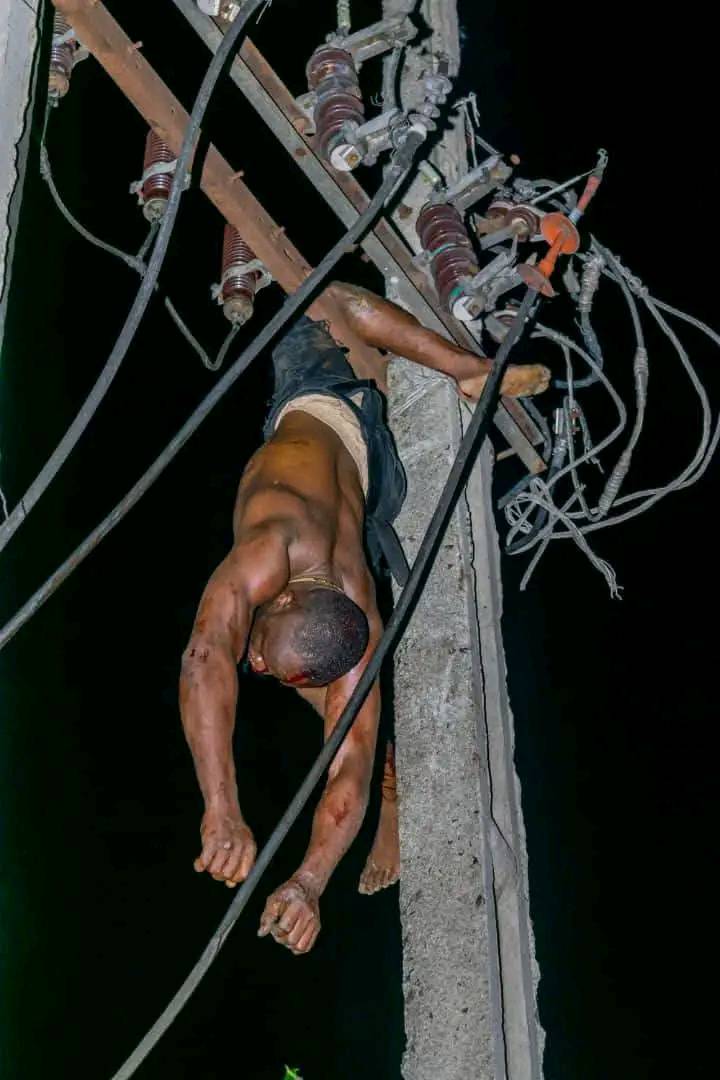Suspected transformer vandal meets waterloo in Abia
In the early hours of Monday, residents of Chief Nwangwa Street in the Ogbor Hill area of Aba, Abia State, awoke to a chilling sight— the lifeless body of a young man suspended from a high-tension electricity pole, a grisly outcome of what appears to have been a failed attempt to vandalize a transformer.
The yet-to-be-identified individual, believed to be in his late twenties or early thirties, reportedly suffered electrocution while allegedly trying to tamper with electrical components at the Wilcox Relief transformer. The community, known for its bustling mix of residential and commercial activities, was stunned into silence as the tragedy unfolded before dawn.
What began as an alleged act of sabotage ended in tragedy, sparking a wider conversation about power infrastructure vandalism, community safety, and the persistent energy crisis in Nigeria.
YOU MAY READ
Trans-Niger pipeline resumes operations after ‘third-party interference’
Eyewitnesses say the body was discovered around 5:00 a.m. by a security guard attached to a nearby business complex. According to residents, the man had climbed the electric pole under the cover of darkness, possibly sometime around midnight.
“People woke up to see someone hanging on the pole,” said Mrs. Nnenna Onuoha, a resident of Chief Nwangwa Street. “At first, we thought it was a suicide case, but on closer look, it became clear he had climbing gear, tools, and wire cutters. That’s when we realized he was trying to steal from the transformer.”
The Abia State Police Command and officials of the Enugu Electricity Distribution Company (EEDC) were soon alerted. The power supply was quickly disconnected to allow for safe removal of the body, which had been charred and stiffened by the fatal shock.
According to the EEDC spokesperson, Mr. Emeka Ezeh, “This is an unfortunate yet recurring incident across our coverage areas. Individuals who engage in vandalism underestimate the risks involved. Once power is restored to a line they believe is dead, the consequences are often fatal.”
The death of the suspected vandal sheds light on a troubling epidemic that has crippled power infrastructure across the South-East and other regions of Nigeria: the theft and destruction of transformers, cables, and other electrical installations.
Data from the EEDC indicates that over 120 transformers were vandalized in the past year alone across Abia, Enugu, Imo, Ebonyi, and Anambra states. Aba, as a commercial hub, is particularly vulnerable due to the prevalence of small industries, many of which depend on a consistent power supply.
YOU MAY READ
Woman K!lled by Her Boyfriend in Suspected Love Triangle
Transformer oil is often drained and resold, copper wires are extracted and sold as scrap, and entire units are sometimes stripped bare. These acts not only disrupt electricity supply but also cost the electricity distribution companies hundreds of millions of naira annually in repairs and replacements.
Mr. Ezeh lamented: “In 2024 alone, EEDC spent over ₦1.6 billion on replacing vandalized infrastructure. We can’t keep up with this level of damage. It is unsustainable.”
Experts say that transformer vandalism is not merely an act of theft, but economic sabotage. The ripple effects are vast—businesses stall, hospitals lose power for critical care, water supply becomes irregular, and streetlights fail, leading to increased insecurity at night.
In many cases, affected communities have to contribute funds to purchase replacement parts or risk being left in darkness for weeks or even months.
“We are tired,” said Mr. Kenneth Uzoamaka, President of the Ogbor Hill Residents’ Association. “This is the fourth time someone has tried to tamper with that transformer. The last time, we were without light for 23 days. We had to tax ourselves to raise money for repairs. Now someone has died trying to do it again? Enough is enough.”
While some vandals operate as individuals, authorities suspect that many are part of a larger syndicate that recruits unemployed youth and engages in coordinated theft of public infrastructure. These groups are often aided by unscrupulous scrap dealers who purchase the stolen components.
In this case, however, no accomplices have yet been identified.
“We believe he was acting alone or perhaps his accomplices fled when he was electrocuted,” said SP Maureen Chinaka, spokesperson for the Abia State Police Command. “Our forensic team is examining the tools recovered at the scene, and we’re calling on anyone with information about the deceased to come forward. His identity is still unknown.”
Interestingly, the suspected vandal had no identification on him. He wore a pair of worn jeans, a t-shirt, rubber sandals, and a tool belt containing pliers, a voltage tester, and metal cutters.
As investigations continue, some have begun to question whether the man was indeed a career vandal or simply a desperate individual driven by economic hardship. With Nigeria’s unemployment rate hovering above 33% and youth unemployment particularly dire, some view the incident as a symptom of a deeper national crisis.
“There’s no excuse for crime, but let’s not pretend these things happen in a vacuum,” said Dr. Chika Ezeogu, a sociologist at Abia State University. “People are hungry. Young men are disillusioned. The economy is contracting. When people can’t find jobs, some take risks that end up costing them their lives.”
YOU MAY READ
Suspected kidnappers k!ll vigilante, abduct colleague in Lagos community
However, others maintain a firmer stance. “Whether he was hungry or not, that transformer serves thousands of us,” said Mrs. Onuoha. “His actions could have caused a fire or explosion. It’s time communities start taking action before we lose everything.”
One of the persistent issues highlighted by the Ogbor Hill community is the lack of effective security around vital infrastructure. Most transformers in the area are not fenced, monitored, or lit, creating opportunities for criminals to strike at night.
“We’ve written to the local government, even offered to build a fence around the transformer, but we got no support,” said Uzoamaka. “There are no security patrols either. It’s like the government doesn’t care.”
Some communities have taken matters into their own hands by organizing vigilante groups to guard transformers and other critical infrastructure.
“We take turns at night,” said Chinedu, a youth leader in a nearby community. “We’re not armed, but we have whistles and phones. If we see anything suspicious, we call the police. That’s how we’ve managed to keep our transformer intact.”
Critics have accused electricity distribution companies of negligence, arguing that many transformer units remain unfenced and unprotected.
But EEDC defends its position, citing financial constraints and the scale of operations. “We manage thousands of installations across multiple states,” said Mr. Ezeh. “We simply can’t police every single one. This is why we encourage community partnership.”
He added that EEDC has been lobbying for stiffer penalties against infrastructure vandals and better collaboration with local and state governments.
Transformer vandalism is a criminal offence under Nigerian law. The Electricity Act 2023 prescribes stringent penalties for tampering with power infrastructure, including imprisonment ranging from 5 to 21 years depending on the gravity of the offense.
In recent months, there have been calls for special mobile courts to fast-track prosecution of offenders. Some lawmakers are also advocating that electricity-related crimes be treated as acts of economic terrorism.
YOU MAY READ
Foreign Tourists Dead from Suspected Methanol Poisoning in Laos
“We cannot continue to watch this rot eat away at our national development,” said Hon. Ifeanyi Nwachukwu, a member of the House Committee on Power. “Every time a transformer is stolen or damaged, it sets back an entire community. We must get serious about deterrence.”
For many residents of Ogbor Hill, the death of the suspected vandal is both a tragedy and a wake-up call. It is a stark reminder of the perils of tampering with electrical infrastructure and the need for stronger protections, both institutional and communal.
“This is someone’s son,” said Mrs. Onuoha, her voice softening. “Even if he was doing something wrong, he didn’t deserve to die like this. But maybe now the government will finally listen to us.”
As authorities work to identify the deceased and possibly trace his next of kin, questions linger—how many more lives must be lost before the scourge of infrastructure vandalism is brought to an end?
In the wake of the incident, the Ogbor Hill Residents’ Association has submitted a letter to the Aba North Local Government Council with the following demands:
- Immediate fencing of the Wilcox Relief transformer station.
- Installation of solar-powered security lights around all transformer units.
- Deployment of a joint task force to patrol vulnerable areas at night.
- Financial support for community-led neighborhood watch programs.
- Public awareness campaigns about the dangers of vandalism and electricity theft.
In a nation where citizens often battle daily with blackouts, it’s ironic that one man found death not in darkness, but in the unexpected return of light.
The tragedy on Chief Nwangwa Street serves as a potent symbol of the tension between desperation and development, criminality and consequence.
For now, the pole has been cleared. The burnt remains have been removed. But the memory—and the warning—remains etched in the consciousness of a community caught between hope and helplessness.
As Nigeria continues its pursuit of energy reform, one hopes this grim episode is not just another headline, but a catalyst for urgent action—before another vandal climbs, and another mother mourns.





